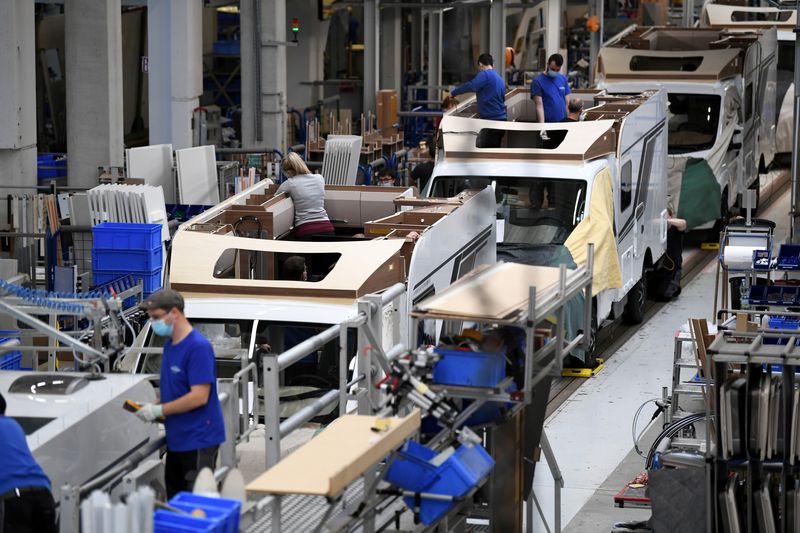Euro zone factory activity contracted in July as recession fears grow
2022.08.01 11:14

FILE PHOTO: Workers assemble campers at Knaus-Tabbert AG factory in Jandelsbrunn near Passau, Germany, March 16, 2021. Picture taken March 16, 2021. REUTERS/Andreas Gebert/File Photo
LONDON (Reuters) – Manufacturing activity across the euro zone contracted last month with factories forced to stockpile unsold goods due to weak demand, a survey showed on Monday, adding to concerns the bloc could fall into a recession.
S&P Global (NYSE:SPGI)’s final manufacturing Purchasing Managers’ Index (PMI) fell to 49.8 in July from June’s 52.1, just ahead of a preliminary reading of 49.6 but its first time below the 50 mark separating growth from contraction since June 2020.
An index measuring output, which feeds into a composite PMI due on Wednesday and seen as a good gauge of economic health, sank to a more than two-year low of 46.3. In June it was 49.3.
“Euro zone manufacturing is sinking into an increasingly steep downturn, adding to the region’s recession risks. New orders are already falling at a pace which, excluding pandemic lockdown months, is the sharpest since the debt crisis in 2012, with worse likely to come,” said Chris Williamson, chief business economist at S&P Global.
“Lower than anticipated sales, reflected in accelerating rates of decline of new orders and exports, have led to the largest rise in unsold stocks of finished goods ever recorded by the survey.”
The new orders index fell to 42.6 from 45.2, its lowest since May 2020 when the coronavirus pandemic was starting to grip the world, indicating scant chances of a turnaround anytime soon.
S&P Global said production was falling in all countries surveyed other than the Netherlands and that the rate of decline was of particular worry in Germany, France and Italy – the bloc’s three biggest economies.
The U.S. economy unexpectedly contracted last quarter, raising the risk the world’s largest economy was on the cusp of a recession.
Still, last month the European Central Bank raised interest rates by more than expected as concerns about runaway inflation trumped worries about growth.
Euro zone inflation rose further from the ECB’s 2% target to a record high of 8.9% in July, preliminary official data showed last week. While the input and output prices indexes fell in the PMI survey they remained high.
The bloc’s economy grew faster than expected last quarter, an early reading showed on Friday, but a July Reuters poll gave a 45% chance of a recession within a year.[ECILT/EU]







